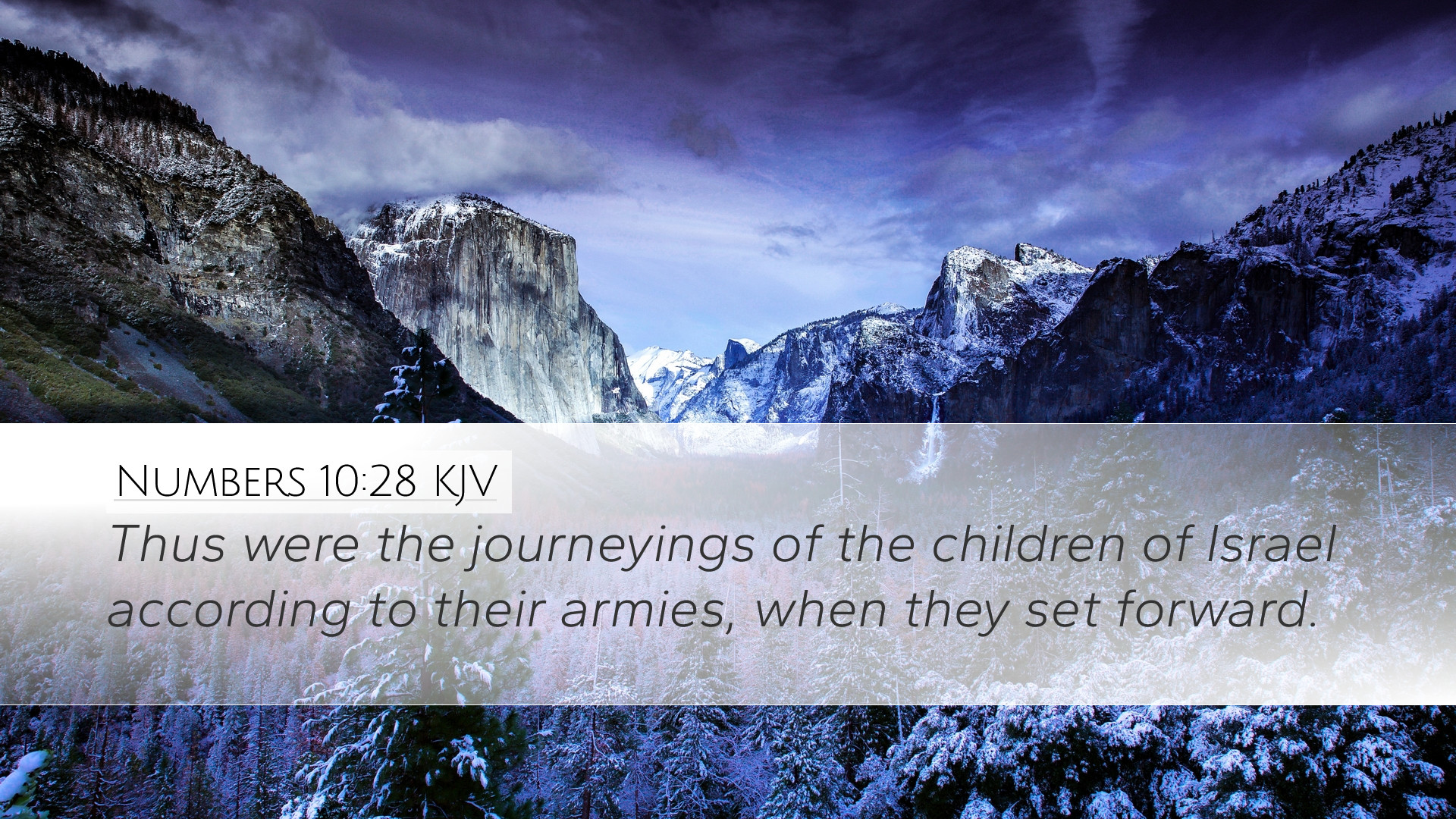Commentary on Numbers 10:28
Bible Verse: "Thus were the journeyings of the children of Israel according to their armies, when they set forward." (Numbers 10:28, KJV)
Introduction
This commentary on Numbers 10:28 delves into the significance of the journeyings of the Israelites in the wilderness. The verse encapsulates the organized movement of the tribes as they followed God's divine instructions. The importance of order and structure in their journey emphasizes the Israelites' reliance on divine guidance.
Contextual Background
The book of Numbers, often called "In the Wilderness," chronicles the experiences of the Israelites as they wander through the desert towards the Promised Land. After the instructions on the camps in chapters 1-4, the narrative shifts to the movement of these tribes as they are organized for travel. The structure set forth illustrates both God's presence and leadership among His people.
Insights from Public Domain Commentaries
-
Matthew Henry
Orderly Conduct: Matthew Henry emphasizes the significance of the organized manner in which the Israelites journeyed. He points out that their orderly setup, under the leadership of Moses, reflects not only military precision but also their acknowledgment of God's authority. Each tribe, representative of a larger spiritual truth, marched forward with a collective focus on God's promises.
Spiritual Implications: Henry notes that the order of the journey mirrors the order within the church. Just as the Israelites were called to follow God's commands, Christians are also to adhere to Christ's guidance, fostering unity and strength in the body of believers.
-
Albert Barnes
Military Aspect: Barnes highlights the military connotations of this verse. The mention of “according to their armies” illustrates that the Israelites were not merely a group of travelers but a well-structured community prepared for any conflicts that might arise. This militaristic order suggests readiness and vigilance, which are crucial for the people of God as they step into uncertain territories.
Divine Leadership: Furthermore, Barnes emphasizes the divine command behind this structure. The journey was not just about moving from one point to another but about following the cloud, a representation of God's presence. This aspect invites believers to consider their own journeys, and how they are led by divine guidance, which affirms God's faithfulness to His promises.
-
Adam Clarke
Collective Identity: Adam Clarke offers a focus on the identity of the Israelites as a collective body. He illustrates the importance of unity among the tribes during their journey. Clarke points out that the phrase “when they set forward” is a call to action, whereby every individual tribe contributed to the overarching mission of reaching the Promised Land.
Lessons for Contemporary Faith: In his analysis, Clarke draws parallels to modern Christian life, emphasizing that just as the Israelites relied on divine direction, today’s believers must remain committed to collective movement under Christ’s lordship. The church today thrives when it moves together in faith and purpose, reminiscent of the unified journey of the Israelites.
Theological Reflections
This verse is rich with theological implications regarding community, leadership, and divine guidance. The structure of the Israelite camp and their journey teaches contemporary believers about the importance of following God's will and working together towards a common goal. It reminds us that our spiritual journey is not solitary but done in the context of community — the Church.
God's Sovereignty: The movement of the Israelites serves as a testament to the sovereignty of God. Every journey detail is a manifestation of His perfect plan, directing the pathways and timing of His people. This therefore can reinforce a believer's faith in God’s overarching narrative in their own lives.
The Journey as a Metaphor: As theologians interpret the journey itself as a metaphor for the Christian life, this verse encourages believers to reflect on their own progression — the challenges, lessons learned, and reliance on God along the way.
Conclusion
Numbers 10:28 not only recounts a historical moment of the Israelites but also encapsulates fundamental truths for today’s believers. With rich insights from Matthew Henry, Albert Barnes, and Adam Clarke, we understand that the journey of faith is imbued with order, purpose, and divine guidance. As the church endeavors to follow Christ, may it reflect the unity and commitment exemplified by the Israelites in their pilgrimage. Let us embrace our journey together, grounded in God's promises and empowered by His Spirit.


